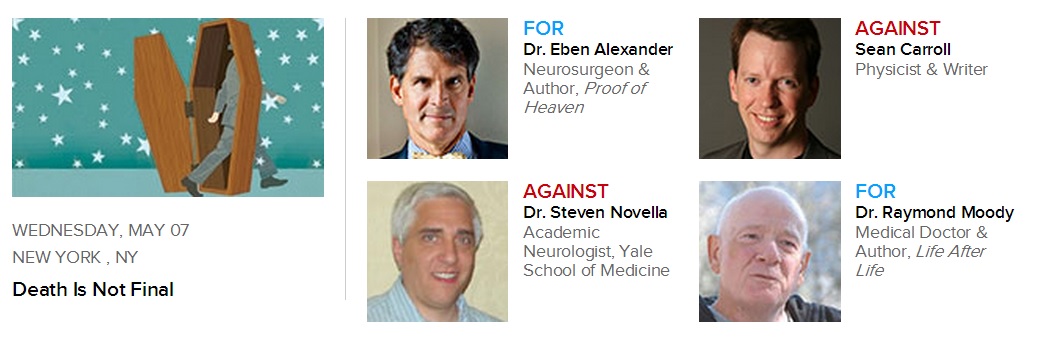May
08
2014
The debate hosted by Intelligence Squared on the proposition – Death is not Final, was a lot of fun. Of course, I am pleased with the outcome, as I think my partner, Sean Carroll, and I performed well, and in the end we won the final audience vote.
Off stage I found Raymond Moody to be a very nice guy. He is a philosopher of logic, and in general seems to understand a great deal about skepticism. He rejects the pseudoscience of ESP and other paranormal claims. Yet – he seems to have a soft spot for claims of the afterlife. Not surprising since he wrote the book on NDEs in the 1970s.
Eben Alexander was also very friendly, as I expected given his interviews and everything I have read about him.
Although interesting, debates are terrible venues for carefully dissecting the evidence. There is no time to look up references and check claims. Two times Eben Alexander and I came to an “impasse” and had to simply move on.
Continue Reading »
May
06
2014

I will be involved in a debate Wednesday evening (May 7th) at the Kaufman center in New York.
The debate will be from 6:45 to 8:30pm.
The debate is hosted by Intelligence squared, which hosts a series of such debates. While tickets are sold out, the debate will be live streamed. I have embeded the stream below, or you can see the stream here: http://goo.gl/WNV6nQ
The specific topic is “Death is not Final”
Against this proposition will be me and Sean Carroll. Sean is a physicist, so he will cover the physics angle, while I will cover the neuroscience.
For the proposition will be Eben Alexander, author of Proof of Heaven, and Raymond Moody, author of Life after Life.
The evening promises to be very interesting, so please tune in.
You can view the live stream of the debate here:
May
27
2014
 Whenever the discussion of a dualist vs materialist model of the mind comes up, one common point made to support the dualist position (that the mind is something other than or more than just the functioning of the brain) is that the brain may not be the origin of the mind, but rather is just the receiver. Often an explicit comparison is made to radios or televisions.
Whenever the discussion of a dualist vs materialist model of the mind comes up, one common point made to support the dualist position (that the mind is something other than or more than just the functioning of the brain) is that the brain may not be the origin of the mind, but rather is just the receiver. Often an explicit comparison is made to radios or televisions.
The brain as receiver hypothesis, however, is wholly inadequate to explain the relationship between the brain and the mind, as I will explain below.
As an example of the brain-receiver argument, David Eagleman writes in his book Incognito:
As an example, I’ll mention what I’ll call the “radio theory” of brains. Imagine that you are a Kalahari Bushman and that you stumble upon a transistor radio in the sand. You might pick it up, twiddle the knobs, and suddenly, to your surprise, hear voices streaming out of this strange little box. If you’re curious and scientifically minded, you might try to understand what is going on. You might pry off the back cover to discover a little nest of wires. Now let’s say you begin a careful, scientific study of what causes the voices. You notice that each time you pull out the green wire, the voices stop. When you put the wire back on its contact, the voices begin again. The same goes for the red wire. Yanking out the black wire causes the voices to get garbled, and removing the yellow wire reduces the volume to a whisper. You step carefully through all the combinations, and you come to a clear conclusion: the voices depend entirely on the integrity of the circuitry. Change the circuitry and you damage the voices.
Continue Reading »
May
19
2016
There has been a lively exchange surrounding John Horgan’s article about skeptics, which I responded to previously. (See also Orac’s and Daniel Loxton’s responses.) At the core of Horgan’s piece is a logical fallacy so common, I feel it deserves special attention. In fact, PZ Myers wrote approvingly of Horgan’s fallacy, showing that it is still alive and well.
That fallacy can be called the fallacy of relative privation, which is a type of red herring or distraction from actual issues. The fallacy is essentially an argument that a problem is not important or does not deserve attention and resources because there are other more important problems. “Why are you wasting your time on X when there are children dying of cancer?”
In Horgan’s case, he would like us to end all war and bring about everlasting world peace before we tackle lesser problems like quackery, fraud, global warming, vaccine denial, the environment, and other such trivialities.
Continue Reading »
Jan
21
2016
Words are important. They definitely shape how we think about things, and are critical for affecting public opinion. I feel that as scientists and skeptics we are often on the losing side of the branding wars, probably because of our pesky attachment to technical accuracy, transparency, and honesty. Or maybe we just stink at marketing.
There is one turn of phrase, however, that I think perfectly captures a situation and is useful for communicating the skeptical position – “grief vampires.”
Grief vampires are self-proclaimed psychics or mediums who prey upon the loved ones of those who have recently died. They exploit the grieving for their own monetary gain.
Continue Reading »
May
14
2008
Writing in today”s New York Times, columnist David Brooks discusses the relationship between neuroscience and mysticism – saying that in the future the debate will center around a concept that he calls “neural Buddhism”. He says he is not taking sides, just pointing out that this is where the real debate is going to happen. Well – let the debate begin.
First I want to point out that I read David Brooks regularly because I find his style to be very rational, educated, and thoughtful. He is one of those writers who is worth reading regardless of your political ideology. I particularly enjoy those articles in which he takes a step back and looks at the current political topics of discussion in the context of broader cultural trends. That is indeed what he is attempting to do in this article. Although he is clearly well-read on this topic, I think he has misinterpreted the implications of current neuroscience.
To summarize his position, he is saying that recently there has been a public debate between militant atheists and religious believers. In essence the atheists, like Hitchens and Dawkins, have been challenging believers to defend their belief in God. He writes: Continue Reading »








